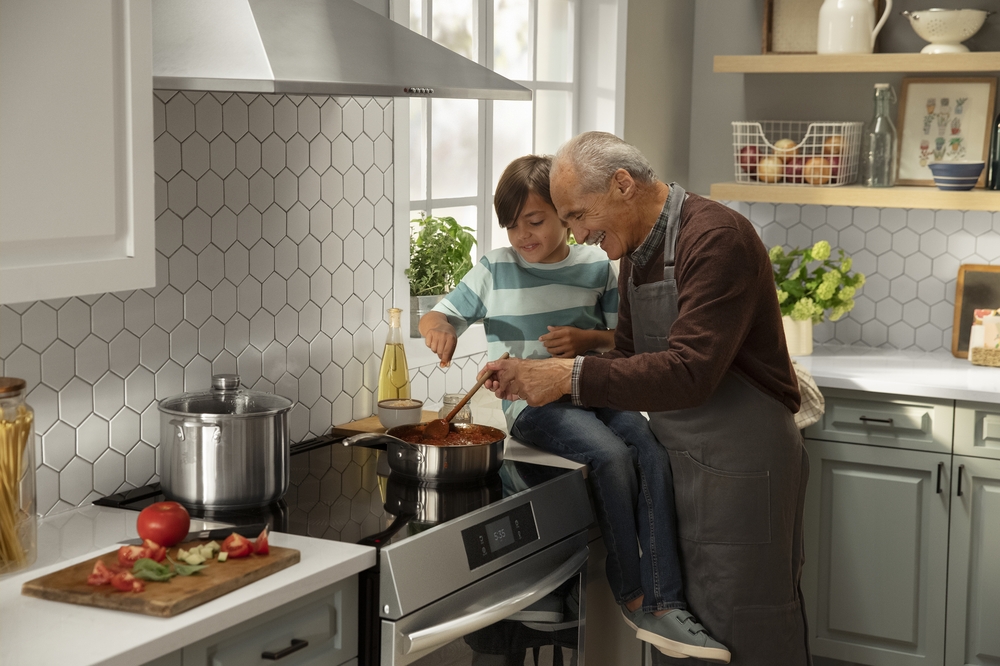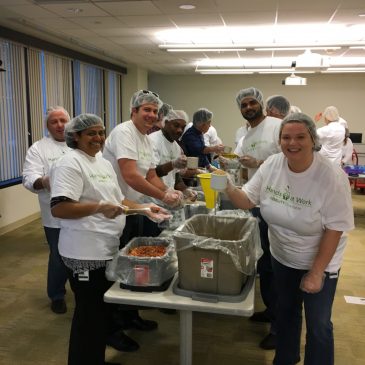Purpose At Work
Purpose At Work: How Fidelity Charitable Makes Giving Easy and Effective

Are you one of those people who pre-heats the water in their dishwasher by running the hot water tap?
Unnecessary with a modern appliance, says Tara Helms, Dir. of Sustainability, Electrolux Group NA. “There's a belief that the dishwasher can't heat the water enough to sanitize and clean your dishes … interesting because dishwashers are designed to do just that.”
How about this: Do you have an army of small tools invading your kitchen counters and crowding your space? Got a steamer? An air fryer? A convection toaster? Did you know a modern Electrolux oven or range “has an induction cooktop and total convection with 15+ different ways to bake—which is a lot,” says Helms. “And includes features like air frying, slow cooking, but built into your oven. Steam bake, built into your oven; you can add water to the bottom reservoir to allow it to steam bake with the actual use of water,” says Helms, who talks about household appliances like a kid in a toy store—a high-tech, industry-leading toy store a hundred years in the making.
Electrolux makes an eponymous brand, plus AEG and Frigidaire brand appliances—that are not your grandmother’s appliances. It has a global staff of about 45 thousand people, with about 10 thousand working in North America. It’s long been a globally recognized leader in sustainability, winning a place among the World’s Most Sustainable Companies in TIME’s inaugural sustainability ranking (no. 89/500 “best for the Earth”).
Says Helms, Electrolux Group focuses on sustainable product design, energy efficiency, and innovative solutions that eliminate food waste, make food last longer, and have faster cooking times.
“[Our kitchen appliances] have all these functions and benefits which in the end are going to eliminate the need for all those small appliances that are filling up the countertops, consolidating them all into one and making it a better experience in the home. And so, when you're talking about outstanding consumer experiences, that is one way that we would talk about it because we've given you so many options and we try to make it easy,” she says.
The innovation aspect is not always the greatest hurdle, argues Helms, who has an extensive background in supply chain management in the energy sector. “It’s our focus to make resource-efficient appliances,” she says, But, she’s in an industry now that is “really unique … [because] we have this strong [consumer] behavior element. So, a significant way that we can make a difference is through matching people’s behavior with the engineering breakthroughs that the appliances enable. And that's the toughest part. But it's truly what we need to break into. Helms asks. “We need to help bring people waste reductions in the home – less wasted energy, less wasted water, and less wasted money on utility bills. Sometimes that means using the product a little different than it’s been used in years past.”
Such “consumer-centric innovation” is one reason Electrolux Group is a leading global appliance company that’s been around since Woodrow Wilson was US President. Today, it sells about 60 million household products in about 120 markets every year, with global sales of US $12B (including sales of $5B in North America).
Helms says the company’s internal research shows that “outstanding consumer experiences” are more important than ever to allow premium pricing and greater competitiveness.
Helms makes the point that maximizing our high-efficiency appliances is critical to improving the water-energy-carbon nexus. Take that humble dishwasher, for example. “It's drawing upon energy and water for use in the home to clean and scrub those plates for continued use over time. And so, the ‘invisible strings’ there are resources, which are energy and water. And if you’re like most people, when you're in the market for a dishwasher, you aren't thinking about the immediate effects of the resource consumption on a per-use basis. Even on your water bill, you're not even sure how much you're using on a per-use basis.” That’s where simple, external metrics can come in handy. “People know and recognize things like ENERGY STAR® Certification,” Helms argues.
However, it’s not only third-party certification that motivates change at Electrolux Group. “We feel the push and pull equally from both ends, both from the industry as from regulators, from customers, from consumers,” Helms says. “I think it's all there and ever-present… What I do know for sure is that the bar for energy efficiency continues to get set higher, and it's a regulated space. And so, we participate in that space. But, in terms of sustainability, what we've done is link our science-based targets and our performance to our carbon goals, to our product development.”
The company looks at various time horizons, including ambitious 2030 sustainability targets, aimed at becoming circular and climate-neutral across operations. “when we're looking at this large-scale product roadmap of a certain category, there's particular attention paid to that one-year, three-year, five-year horizon in terms of the strategic development.”
Electrolux still makes vacuums, once sold door-to-door in Sweden during World War I, and it makes washers and dryers—but during Covid, says Helms, much of the world’s attention turned to the kitchen. “It’s not just a room in your house anymore. It's really where everybody congregates. And it's not just about preparing and cooking food there anymore. It's the heart of the home.
“It's interesting to see people exploring the kitchen more. And it's not just the cooking, it's the whole ecosystem. It's ‘How do I choose the right foods to bring into my home? How do I ensure that they last a long time? How are they ready for me when I want to cook? How can I intuitively know what I can cook and prepare based on what I have? What functions and modes, innovations, technologies can I use? How can I teach my children how to cook?’ You know, it's this full ecosystem of opportunities” says Helms.
“What we know, too, is that the family dynamics in the home have also shifted. It's multi-generational homes and different forms of families all across the world. So, it's trying to tune into our consumers’ needs and how do we serve them...?”
Speaking of serving children, Electrolux’s Food Foundation is an independent, non-profit organization founded and funded by Electrolux Group since 2016 to promote more sustainable food choices and support people in need.
“It’s my favorite,” says Helms. “The Electrolux Food Foundation is a program that's designed specifically to educate children and it's done across all markets in the world. We have a lot of backing within the organization and we run programs for school-age children to teach them about what it means to eat more sustainably. So, what does sustainable eating mean? What does it look like for the carbon footprint of meats versus vegetables versus fruits versus legumes? And how can that shape our plates now, and how can it shape what we choose to eat going forward? And, of course, that's where it's very worthwhile.
“Because, as we can start to change behaviors and shift behaviors early on so that when they're coming into that moment where they are the ones in the house buying the food, preparing the food, cooking the food, buying the appliances, they come with a different mindset than we once had. And so, this one I'm particularly passionate about because I'm a mom, too.”

Purpose At Work: How Fidelity Charitable Makes Giving Easy and Effective
WE Day 2016 – Los Angeles
One-to-one Connections: Inspiring Others To Share Your Brand Story #SocBiz25

